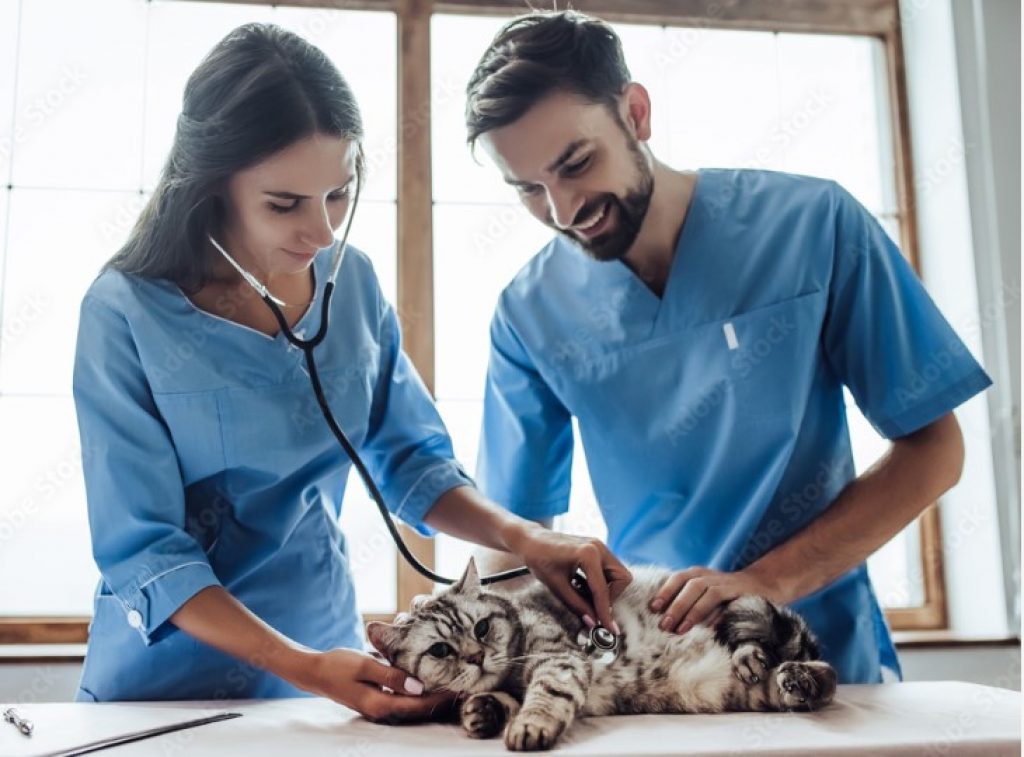
What Is A Veterinary Nurse?
Discover what it truly means to be a Veterinary Nurse. From caring for furry friends to assisting in complex procedures, this informative guide will engage you with all the exciting aspects of this rewarding profession. Join us and unlock the world of veterinary care!
What is A Veterinary Nurse?
Veterinary nurses are caring, self-driven paraprofessionals who prioritize the welfare of animals. Animal nurses are responsible for a variety of medical tasks, including animal care, lab testing, surgical assistance, anesthesia administration, x-ray imaging, diet management, teeth cleaning, physical therapy, and educating clients.

The veterinary assistant’s wide scope of responsibility allows them to affect all facets of animal welfare. Due to their important role in veterinary hospitals and animal care and research facilities, there is a high demand for veterinary nurses.
What are the Types of veterinary nursing?
Your profession and personal interests will determine which of the following you focus on.
Common Practice:
Vaccinating, spaying, deworming, and doing health checks are all part of the primary care given to animals.
Stability drills:
Nighttime and weekend clinics that treat patients in a medical emergency
Clinical Referrals:
Professional clinics that focus on treating certain conditions. Orthopedics, cancer, and ophthalmology are only a few examples. Some may only suit certain animal species, such as dogs, horses, or exotics.
Which Animals Can a Veterinary Nurse Treat?
Various strange and amazing animals may fall under your purview as a Veterinary Nurse. Many people believe that as a Vet Nurse, you would solely work with common household animals. However, this is untrue.
Wildlife:
Wild animals are often taken to veterinary facilities when they are injured and need immediate medical attention.
Zoo:
Get veterinary experience working with exotic animals at a zoo or safari park.
Equine:
Respond to emergencies involving horses or further your education to become a certified Equine Veterinary Nurse.
Farm:
Cattle, sheep, and goats, among other farm animals, frequently need veterinary attention. These are more likely to happen if you operate in a veterinary clinic in a rural area.
What do Veterinary Nurses do?
The specific duties would depend on the animal in question, but often you would:
- Create nurse care plans and implement them.
- Keep animals still and quiet while they’re being treated.
- Administer medication and injections as directed by the veterinarian.
- Perform laboratory work at the clinic, including blood, urine, and other animal samples.
- Clean and disinfect equipment.
- Conduct X-rays.
- Get the animals ready for procedures.
- Assist vets with surgical procedures.
- Remove sutures and perform other minor treatments.
- Clients should be updated on their animals’ conditions and progress.
- Feed, clean cages, groom, and exercise any in-house pets you may have.
- These clinics should be held.
- Guide animal care to people who need it..
What are the skills of A Veterinary Nurse?
Veterinarian nurses are educated in all aspects of animal care, such as nutrition, parasite control, illness, and confinement. These are just a few of the many duties of a veterinarian assistant. The animals in their care can benefit from the following list of eight talents that veterinary nurses should have.
physically strong:
Working as a veterinary assistant is a physically demanding profession. A nurse must possess the skill and a kind touch while dealing with delicate medical equipment or a terrified dog or cat. Long periods of standing and the ability to lift animals and heavy equipment are essential to a person’s success in this profession.
maintain composure:
As a veterinary assistant, you’ll need to be cool under pressure because you’ll frequently be on-call for crises involving pets. Animals are much more attuned to human emotions and might pick up on your anxiety, leading to a panic attack.
Keeping calm in dangerous circumstances might prevent more injury, such as bites or scratches. Many pet owners will be highly emotional about their pets’ health; maintaining your composure is especially important.
quick thinker:
Quick thinking and responsiveness are essential qualities for veterinary nurses. It is crucial for the animal’s health and the confidence and competence of your colleagues that you can think on your feet with little to no notice and simultaneously make sensible, dependable decisions. Being attentive and adaptable in your work will make you a valuable veterinary assistant.
care about animal welfare:
Vet techs and assistants are passionate about helping animals and forming meaningful relationships with their owners. Those who can connect with animals on an emotional level and help them get well or stay healthy are the most successful nurses. Being a veterinary assistant requires more than a passing interest in animal care.
not easily frightened:
Many people are forced to deal with unpleasant experiences when analyzing and monitoring animal health. Stool samples, urine, blood, vomit, diarrhea, and parasites are common substances that veterinary nurses must deal with.
Animals with severe injuries are often brought in, such as broken and protruding bones or burst-out eyeballs. In these cases, you must put aside any negative emotional responses you may have. Your coworkers are counting on you to save an animal in need. Therefore, you must ignore any queasy feelings or pain you may be experiencing.
high Emotional Scale:
A strong sense of self, the ability to effectively manage relationships, and an acute awareness of one’s social surroundings are all examples of the emotional intelligence essential for a veterinary assistant. Better assess and respond to your immediate environment by identifying and controlling your emotions and being more responsive to the emotions of pet owners and colleagues. In times of crisis, controlling your emotions and acting rationally is especially important.
optimistic outlook:
Clients and patients can bring a wide spectrum of feelings to a veterinarian’s office. Whatever may occur in the clinic on any given day, assistants and nurses should have an enthusiastic, positive, and professional demeanor. Owners will appreciate your commitment to your work and their dogs’ well-being if you demonstrate your love for animals.
impressive trait:
The capacity to swiftly adjust to new situations is crucial for veterinary assistants because of the wide range of situations they may experience daily. The nursing profession is fraught with ambiguity and uncertainty, necessitating a willingness to adapt to new situations and places. An effective assistant at a veterinarian clinic can roll with the punches of competing demands, unexpected shifts, and shifting priorities.
Why Go to School for Veterinary Nursing?
Those who are determined on a career working with animals should consider veterinary nursing. If you care deeply about animals, you’ve probably heard about veterinary nurses and their vital role in improving animal care. You can make a difference in the lives of animals every day, and the work is interesting, demanding, and fulfilling.
How to become Veterinary Nurse?
You must undergo a lengthy training program before working as a veterinary nurse. Get your GED or high school graduation first, then enroll in an approved college or university to earn a degree in veterinary technology or a closely related profession. You will learn the fundamentals of animal anatomy, physiology, pharmacology, and medical practices during your coursework.
In addition, you can participate in internships or clinical rotations to get practical experience. To become a licensed veterinary nurse, you must complete your studies and then take and pass the Veterinary Technician National Examination (VTNE). You will be tested on various veterinary medicine-related knowledge and expertise.
A veterinary nurse can work in various locations after certification, including private practices, animal hospitals, universities, and zoos. A veterinary nurse’s duties span from assisting with surgical procedures and medicine administration, collecting samples for analysis in the lab, and providing comfort to animals in need.
What Makes a Good Veterinary Nurse?
A good veterinary nurse genuinely loves animals and is committed to their well-being. Veterinary nurses frequently bring their work home with them, sometimes in the shape of abandoned or stray animals or frightened kittens that must be raised by hand.
It would help if you were comfortable in both a team setting and working independently, as well as able to handle your position’s emotional and physical demands. Kennels and cages will always need to be cleaned, as will the floors, so be ready to get your hands dirty sometimes.
If becoming a veterinary nurse has ever interested you, you may have pondered what qualities are necessary to succeed. To help you answer that question, here are a few of the traits we believe are essential in a veterinary nurse:
Don’t let the fact that you may lack some of these abilities prevent you from pursuing a career as a veterinary nurse. Professional veterinary nurses can originate from any background and develop unique abilities throughout their careers.
How Much Does A Veterinary Nurse Make?
According to the Bureau of Labor Statistics, as of May 2020, the median annual wage for veterinary technologists and technicians was $36,670. However, it’s important to note that this figure represents the median, meaning that half of the veterinary nurses earn more than this amount while the other half earn less.
What’s the job outlook for veterinarians?
The Bureau of Labor Statistics (BLS) projects the job availability for veterinarians to increase by 19% between 2021 and 2031. This expected growth means an increase from 86,300 jobs in 2021 to 103,100 jobs in 2031.
Conclusion
A career as a veterinary nurse offers a fulfilling and meaningful way to work with animals. While the average salary may not be the highest among healthcare professions, it can still provide a comfortable living, especially considering the potential for growth and advancement. Ultimately, the decision to pursue a career as a veterinary nurse should be based on your passion for animals and the desire to impact their lives positively.
FAQ’s
What is a Veterinary Nurse?
A Veterinary Nurse is a compassionate and skilled nurse who works hand in paw with veterinarians to deliver top-notch medical care to our furry friends.
What does a Veterinary Nurse do?
A Veterinary Nurse performs various tasks, including administering medications, assisting in surgeries, taking X-rays, monitoring anesthesia, providing nursing care to animals, and educating pet owners on animal health and wellness.
How does one become a Veterinary Nurse?
To become a Veterinary Nurse, one must complete a recognized veterinary nursing program and obtain relevant certifications or licenses. The specific requirements may vary depending on the country or state.
What skills are required to be a Veterinary Nurse?
Veterinary Nurses should have strong communication skills, compassion for animals, attention to detail, ability to work in a team, and good problem-solving abilities. They should also possess knowledge of animal care and medical procedures.
Are Veterinary Nurses the same as Veterinary Technicians?
In some countries, Veterinary Nurses and Veterinary Technicians are considered the same. However, in certain regions, the roles and responsibilities may vary. It’s best to check with your local veterinary authority for specific information.
Can Veterinary Nurses perform surgeries?
Depending on their level of training and the regulations in their jurisdiction, Veterinary Nurses may assist veterinarians during surgeries. However, the actual performance of surgeries is typically reserved for licensed veterinarians.
Do Veterinary Nurses work with all types of animals?
Veterinary Nurses can work with various animals, including dogs, cats, birds, reptiles, small mammals, and sometimes even larger animals such as horses or livestock. The specific scope of practice may depend on the setting and specialization.







